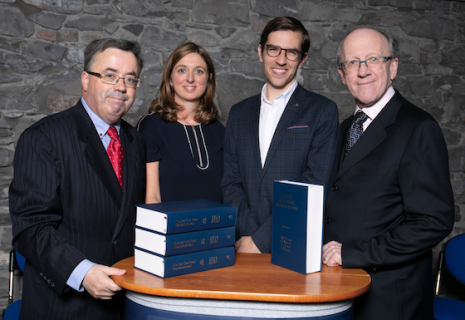Kelly's Irish Constitution, 5th Edition - Launch
The School of Law is delighted to announce the recent launch of the 5th edition of Kelly's Irish Constitution, published by Bloomsbury Professional. This authoritative tome, written by Professor Gerry Whyte, former colleague, Mr. Justice Gerard Hogan now Advocate General to the European Court of Justice, Dr. Rachael Walsh and Dr. David Kenny was launched by Seamus Woulfe, Attorney General. Congratulations to all involved.
On Thursday 22 November, a special reception was held at the Distillery Building in Smithfield to commemorate the launch of the fifth edition of one of Ireland’s most revered legal manuscripts, Kelly: The Irish Constitution.
Hosted by the Attorney General Mr Seamus Woulfe SC, the event was well-attended – with almost two hundred members of the legal profession gathering to commemorate this sacred legal text and to pay their respects to its original author, the late John Maurice Kelly.
Anchored by constitutional law stalwarts, Professor Gerry Whyte of Trinity College and Gerard Hogan, formerly of the High Court and now an Advocate-General at the ECJ, the new edition has welcomed aboard Drs Rachael Walsh and David Kenny, assistant professors of law at Trinity.
Delivering his opening remarks, Mr Woulfe commented that it was a ‘truly great honour’ to speak at the launch of what is ‘probably the leading textbook in Irish law’. Having commenced his studies in 1980, the same year the first edition of Kelly came out, he recalled feeling as if his class had a distinct advantage over previous years.
The Attorney General then paid homage to the late J.M. Kelly, a man who distinguished himself in a multitude of different roles, including time spent as a lecturer at UCD, a Senator, Teachta Dála and parliamentary secretary, as well as a brief stint as Attorney General.
Even if it his skill as a learned and concise writer on matters of constitutional law which has earned the most acclaim, Kelly’s reputation as a ‘great orator of the old tradition’ should not be forgotten, according to Mr Woulfe. He was a man who could express himself with ‘peculiar clarity’, a trait best exemplified by many speeches given in the Houses of the Oireachtas.
Professor Whyte then took the stand to offer a few brief words of thanks, firstly acknowledging his ‘intellectual indebtedness’ to J.M. Kelly, a man who set tremendously high standards in terms of his ‘erudition, clarity of expression and industry’.
While the fourteen-year lapse between editions was admittedly ‘unconscionable’ according to Dr Whyte, this delay is at least in part attributable to an ‘explosion in constitutional jurisprudence’ – and he credits Rachael and David with helping the project get over the line.
Closing out the evening, Dr Rachael Walsh fondly recalled the ‘instantaneous positive response’ she and David gave when they were asked to come on board for the fifth edition – jokingly adding that she was ‘wading through first year constitutional law and David was sitting his Leaving Certificate’ when the last edition was released.
To borrow from Professor Whyte, another fourteen-year delay would indeed be ‘unconscionable’, given the rapid rate of change brought about by the afore-mentioned ‘explosion in litigation’ coupled with the increasingly-frequent running of constitutional referenda. One may only hope that the authors will reconvene to draw up battle plans for a sixth edition soon.


